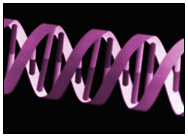 People
who inherit one sickle cell gene and one normal gene
have the sickle cell “trait”. People with sickle cell
trait usually do not have any of the symptoms of the
disease, but they can pass it on to their children. People
who inherit one sickle cell gene and one normal gene
have the sickle cell “trait”. People with sickle cell
trait usually do not have any of the symptoms of the
disease, but they can pass it on to their children. |
To learn more about sickle cell trait click on one of the following links or scroll
down the page.
|
Q How is sickle
cell trait diagnosed?
A Sickle
cell trait is diagnosed with a simple blood test. People
at risk of having sickle cell trait can talk to a doctor
or health clinic about getting this test. |
|
Did you know:
People at high risk for having sickle cell
trait are those whose ancestors come from
Africa, South or Central America, Caribbean,
Mediterranean countries, India, and Saudi
Arabia. |
|
[Return to top of page]
Q Are there
any complications?
A It is
possible for a person with sickle cell trait to
experience complications of sickle cell disease, such as
splenic sequestration, “pain crisis”, and, rarely,
sudden death.
This can happen under extreme conditions of:
- High altitude (flying, mountain climbing, or
cities with a high altitude)
- Increased pressure (scuba diving)
- Low oxygen (mountain climbing or exercising
extremely hard, such as in military boot camp or
when training for an athletic competition)
- Dehydration (too little water in the body)
[Return to top of page]
Q
Can women with sickle cell trait have a healthy
pregnancy?
 A
Yes; women who have sickle cell trait can have a healthy
pregnancy. People who inherit one sickle cell gene and
one normal gene have the sickle cell “trait”. People
with sickle cell trait usually do not have any of the
symptoms of the disease and live a normal life, but they
can pass the disease on to their children. A
Yes; women who have sickle cell trait can have a healthy
pregnancy. People who inherit one sickle cell gene and
one normal gene have the sickle cell “trait”. People
with sickle cell trait usually do not have any of the
symptoms of the disease and live a normal life, but they
can pass the disease on to their children.
A
genetic counselor can provide information about the
chance of passing the disease to the baby.
During pregnancy, there is a test to find out if the
baby will have sickle cell disease, sickle cell trait,
or neither one. The test is usually conducted after the
second month of pregnancy.
[Return to top of page]
Q
What is the chance of a person with sickle cell
trait having a child with sickle cell trait or sickle
cell disease?
 A
Sickle cell disease is “recessive”, which means that
both parents must pass on the sickle cell gene for a
child to be born with the disease. A
genetic counselor can provide information about the
chance of passing the disease to the baby. A
Sickle cell disease is “recessive”, which means that
both parents must pass on the sickle cell gene for a
child to be born with the disease. A
genetic counselor can provide information about the
chance of passing the disease to the baby.
[Return to top of page]
 |